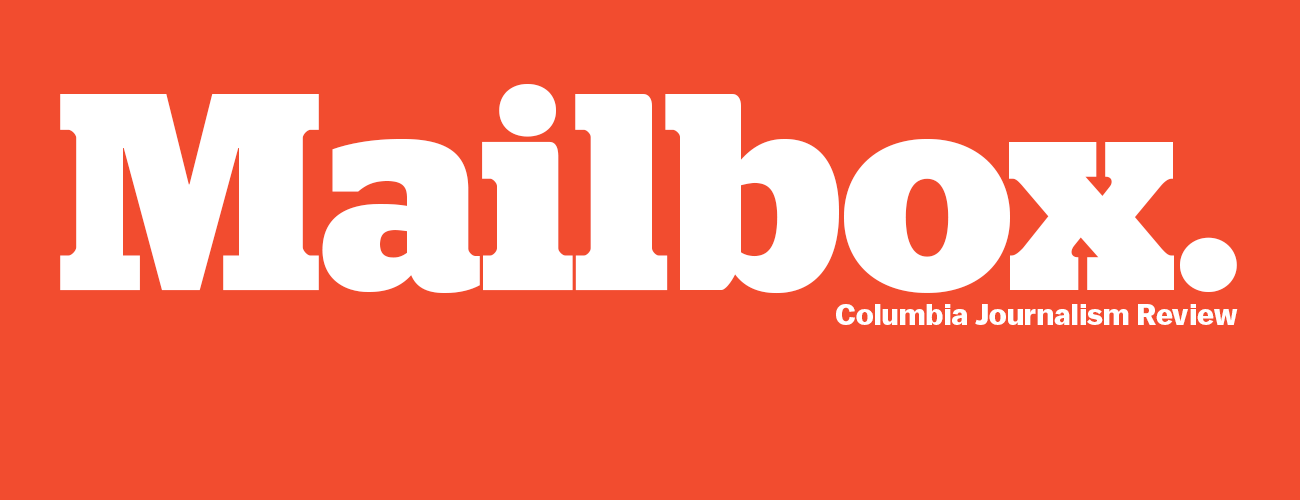Sign up for The Media Today, CJR’s daily newsletter.
HERE IS A SELECTION OF LETTERS AND EMAILS we’ve received since January. Please send correspondence to letters@cjr.org, along with your name, address, and any relevant affiliation.
Must aid be an ethical dilemma?
Feb 19
As journalists, we must be humans first. I belong to the National Press Photographers Association, which has a “Humanitarian Award” fellow photographers who provide aid on the scene, because they arrive before first responders or because they are the only one who can help. We can and should help, as long as it’s within the scope of our training and does not make the problem worse. What we should avoid is becoming the story. Of greater benefit is getting the story out, so others can see the scope and scale of the distress and take action to relieve the suffering.
Peter Roof
The thankless, fruitless art of the presidential interview
Feb 14
I am a reader, not a reporter. I think there is a time to ignore Trump, or at least play down things that he claims or simply says. Give more weight to things he actually has done. (I don’t want to hear what he tweeted, but I do want to hear about the person he nominated for a cabinet position.) This president has changed the way a president behaves. Why shouldn’t the news media change the way it covers a president?
Scott Goldstein
Reuters article highlights ethical issues with native advertising
January 24
I run a small local journalism site and depend on what we call “partnered content.” Our sponsored pieces are all labeled as such and focus on telling the stories of small businesses in the community. Our readers actually enjoy them and appreciate our transparency. Taking money to further a political message is a clear red line. Government propaganda should never be used as native advertising. But stories like this paint a negative light on a revenue model that can in fact help support independent journalism.
Sean Baker
What Is Fox News? Researchers want to know
January 23
Ten years before there was Fox News, there was the Christian Broadcasting Network. I was executive producer of The 700 Club in the 1980s, and CBN, we wrote the playbook Fox News follows. We inserted ourselves at the far right of everybody doing news, because we believed the conservative point of view was not being presented sufficiently by the news media, who were, quite frankly, not interested in the opinions of Rush or others of his ilk. We faced no real pushback from the press, because they didn’t consider our reach large enough to warrant inspection. That was a big mistake. We tested the waters for the Fox News. At every turn, we supported Reagan’s views, even during Iran-Contra (Oliver North was a friend of ours). This included administration-friendly guests of all sorts. We encouraged the belief that the country was hellbound–and argued this was due to “good people” not getting involved in politics. It was a powerful message, especially for fundraising. To our audience, armed with religious zealotry, there was nothing we could say or do that would be met with disapproval. In order to study Fox News, one must begin with their audience. Fox is, after all, just responding to a demand it created itself, just like CBN did in the 1980s.
Terry Heaton
Huntsville, Alabama
The world according to Russ Baker
Mar 1, 2016
I came across your flattering profile of Russ Baker, the founder of the non-profit news site WhoWhatWhy, that ran in your publication a few years ago. In the piece, the author mentions that Baker works on a very low budget, but what the article does not share is what appears to be a potentially exploitative business model. This was highlighted by a journalist recently who provided public documents on Twitter showing that Baker takes in a nice salary, far more than what any journalist I know earns, while most everyone else on the staff is a “volunteer.” (Freelance editors and writers are paid using donations to the site, the document showed.) Baker has been mostly honest about his approach, making explicitly clear in his job postings that WhoWhatWhy is looking for “consistent hours and a long term commitment” from professionals with at least five years of experience, for no pay. But what neither Baker nor the author expressed in the article is how much money Baker pays himself. In 2015, the year before your article was published, Baker took $128,000 of the $300,000 donated to the site. I wonder if the author would have written this sentence if he had known: “Baker even asks staff members who can afford it to take less money so that others can have more.” This is a good reminder to always look at documents, regardless of my trust in the subject.
Daniel Krieger
New York City
Has America ever needed a media defender more than now? Help us by joining CJR today.



